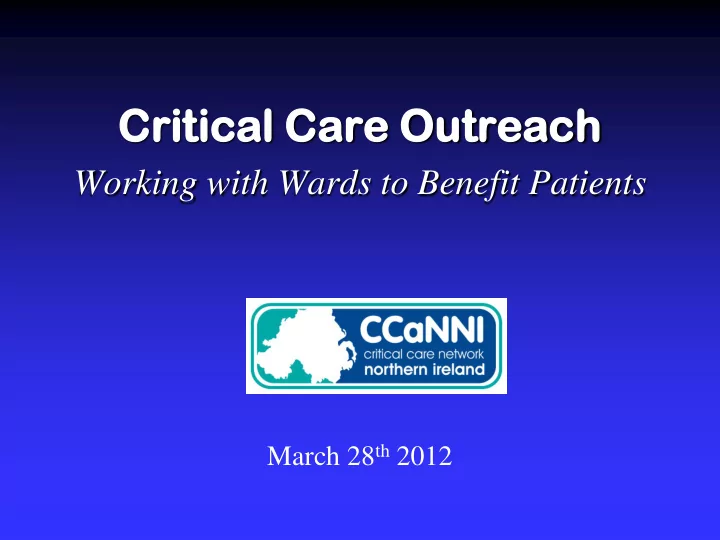

Criti itical cal Car are e Outr treach each Working with Wards to Benefit Patients March 28 th 2012
Outline Critical Care Outreach role & contribution to deteriorating patients Origins of Critical Care Outreach (CCO) Critical Care Outreach: NI perspective
Sub optimal care (Goldhill 1997, McQuillan et al 1998, Goldhill et al 1999, McGloin et al 1999) • Demand for ICU / HDU exceeds provision Literature suggests monitoring of vital signs in wards • sometimes fails to generate effective, timely, intervention for sick patients. Common problems Poor understanding of physiological processes Poor recording & interpretation of vital signs Failure to recognise deterioration Failure to escalate
Review of adult critical care services Strategies for reducing sub-optimal care Identification of patients at risk Provision of critical care outreach Education & sharing of critical care skills Comprehensive Critical Care (DoH 2000)
…. outreach services be developed in all acute hospitals 24/7, the service should ensure use of track and trigger warning systems to identify at-risk patients, initiate rapid referral to appropriately equipped experts or the timely transfer to a critical care unit when needed and facilitation of discharge and rehabilitation of patients from critical care along with development of effective arrangements to manage Level 1 patients on general wards Paragraphs 50 &51
CCO objectives To avert admissions (prevent readmission) 1. to critical care (by early identification of acute illness) To facilitate discharges from critical care 2. The sharing of Critical Care skills and 3. knowledge Improving multi-professional communication and collaborative working Comprehensive Critical Care (DoH 2000)
Who are CCO Team Personnel with core competencies for acute illness Critical Care Nurses Additional physio / medical input NICE CG50 Acutely ill patients in hospital 2007
Role of Outreach Team Follow up All critical care discharges Tracheostomy Rehabilitation ( Rehabilitation after critical illness NICE clinical guideline 83) Rapid response for deteriorating patients Track & Trigger system Structured assessment & plan Interventions
Clinical Deterioration Varying signs / thresholds Possible outcomes Early treatment & recovery Early admission to critical care Delayed admission to critical care Cardiac arrest
Clinical Deterioration
Where things go wrong… Data interpretation Failure to escalate Hierarchical communication Situational awareness
Why things go wrong… Human factors errors are a fact of life The final “product” or service is based on the interaction of; – Processes – Systems – People – Culture
Reliable processes Minimise time between start of deterioration and getting effective treatment By recognising when deterioration starts By ensuring an appropriate response Clear pathways / protocols Standardisation supports reliability
CCO: NI Perspective 3 services in NI • Royal Victoria Hospital - March 2007 • Altnagelvin Hospital - September 2009 • Ulster Hospital - November 2010 • Commissioner agreement to divert funding from 18 th critical care bed Royal Victoria Hospital • Specific funding from DH for Altnagelvin & Ulster Hospital CCO services
CCO Service Profile Altnagelvin Hospital Royal Victoria Ulster Hospital Hospital 7/7 7/7 6/7 not Sunday 08.00 – 16.50 08.00 – 20.00 24 hr service 5 wte staff 7 wte staff 3.6 wte staff Follow up discharges Follow up discharges Follow up discharges + tracheostomy + tracheostomy + tracheostomy Deteriorating patients Deteriorating patients Deteriorating patients – concern re – EWS = 4 or concern EWS = 7 or concern deterioration All wards & depts All wards & depts All wards & depts including maternity including ED but NOT including ED & but NOT ED maternity. maternity.
Activity Data: Jan-Dec 2011
Average Length of Outreach Care
Source of Referral
Patient Outcome after CCO
Cardiac Arrests pre and post CCOT implementation During the 1 year period covered by CCOT Phases 1 and 2, there was a 22% decrease in reported cardiac arrests in the hospital as a whole and a 44% reduction in reported cardiac arrests occurring in the pilot wards.
Benefits of CCO Deteriorating patients Timely & effective care Supported ward management Prevention of cardiac arrest Reliable processes Human factors Teamwork
Summary We are human and that means we are never 100% perfect, 100% of the time. Accept that we all make mistakes or forget things regardless of our experience, technical ability or seniority Reliable processes to mitigate against human factors CCO role in improving patient safety
joanna.mccormick@belfasttrust.hscni.net
Recommend
More recommend